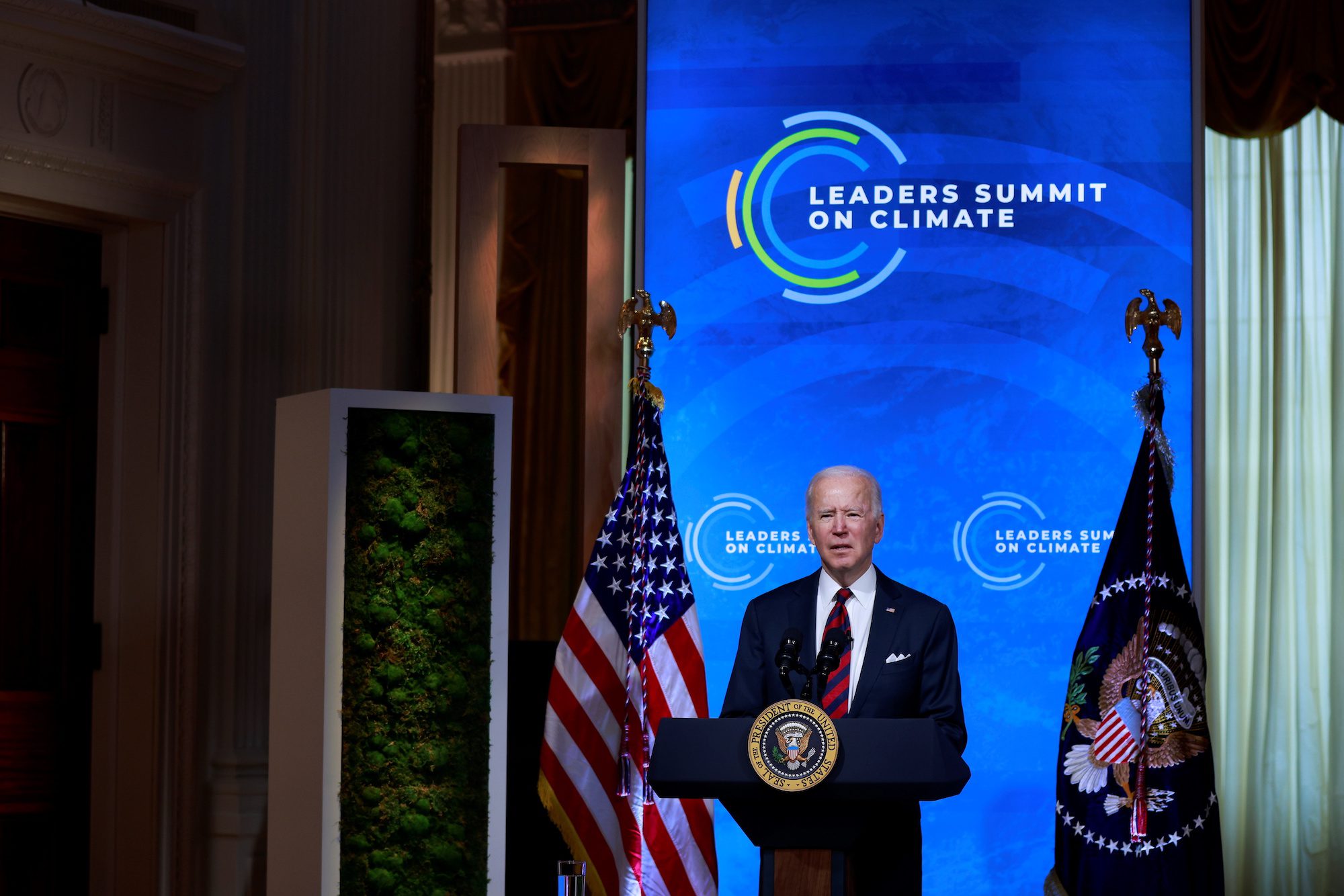By Bloomberg News (Bloomberg) —
Day two of President Joe Biden’s international climate summit concluded on Friday. Biden pledged during the first day of the virtual event to slash U.S. greenhouse gas emissions in half by the end of the decade, part of a plan to bring the U.S. back into the global fight against climate change.
Day two focused on innovation and the economic opportunity in fighting climate change. This is designed to refute skepticism from some blue-collar workers and labor leaders. While renewable energy jobs are growing at a fast clip, labor groups say they pay less than fossil-fuel positions and that companies have opposed unionization.
Speakers on Friday included U.S. Secretary of Energy Jennifer M. Granholm, Israeli Prime Minister Benjamin Netanyahu, United Arab Emirates Prime Minister Sheikh Mohammed Bin Rashid Al Maktoum, Bill Gates and Michael Bloomberg.
White House Fact Sheet: President Biden’s Leaders Summit on Climate
West Virginia Attorney General Calls Biden’s Climate Pledge a Blunder
West Virginia Attorney General Patrick Morrisey delivered a scathing attack on President Joe Biden’s plan to rapidly halve U.S. greenhouse gas emissions, calling the pledge “a colossal domestic and foreign policy blunder of epic proportions.”
In a speech from Charleston, Morrisey said the emissions cuts would “require drastic changes for homes, businesses and factories, eviscerating good-paying union jobs and working-class jobs, and crippling our country’s ability to compete on the world stage.”
Morrisey, a Republican, argued Biden’s approach would “put us dependent on the good graces of our greatest geopolitical rivals.” He said the U.S. changes wouldn’t be matched by China, giving Beijing “profound leverage over our country by making us dependent on imports of critical Earth minerals just to keep our lights on.”
Morrisey led the legal charge against former President Barack Obama’s Clean Power Plan. On Friday, he telegraphed court battles to come: “These types of transformational and highly controversial changes are not dictated by the whims of one man, not even a president,” Morrisey said. “As the chief legal officer of West Virginia, I will ensure that the constitutional separation of powers is upheld, and I will enforce it in court if necessary.”
He also said West Virginia would appeal to the Supreme Court a ruling by the D.C. Circuit Court of Appeals that rejected a Trump administration regulation governing carbon dioxide emissions from power plants. The court also rebuffed arguments that Obama’s Clean Power Plan exceeded statutory authority by mandating sweeping changes across the electric grid rather than just at fossil fuel-fired power plants.
Biden’s new climate pledge requires deep reductions in greenhouse gas emissions from the electricity sector, and new Environmental Protection Agency regulations are seen as critical to achieving them. EPA Administrator Michael Regan has said the decision clears a path for the agency to start fresh on its own plans to address emissions from the power sector. — Jennifer A. Dlouhy and Ellen Gilmer
Biden invited world leaders to join the U.S. in driving a “fourth industrial revolution” to transform the energy sector, create jobs and overcome the threat of climate change, capping his two-day summit on global warming Friday.
Biden cast the event as a success in galvanizing greater ambition to slash greenhouse gas emissions, as world leaders prepare for a critical United Nations meeting on climate in Glasgow in November.
Announcements by Japan, Canada, the European Union, U.K. and other nations “mean that half of the world’s economy is now committed to the pace of actions that we need — at a pace we need — to limit warming to 1.5 degrees,” Biden said. Keeping warming to 1.5 degrees Celsius is seen as a critical tipping point to avoiding irreversible impacts of climate change. Biden stressed that’s “a point of no return.”
But without action to implement those commitments, the pledges are “just a lot of hot air,” Biden said.
He pointed to the possibility for further climate progress between the U.S. and India, the world’s No. 3 greenhouse gas emitter. “I’m looking forward to working with India’s Prime Minister Modi in a new partnership to achieve our climate and energy goals making this core pillar of our bilateral cooperation,” Biden said.
Biden also highlighted the potential for collaboration with Russia’s Vladimir Putin on climate, despite other ongoing U.S.-Russia tensions.
“President Putin and I have our disagreements, and he’s talking about how you capture carbon from space,” Biden said. “The whole notion that it makes overwhelming sense, as much as the president of Russia and I disagree, that two big nations can cooperate to get something done, and this time get something done that benefits everybody.” — Jennifer A. Dlouhy
U.S. to Join Saudi Arabia in New Net Zero International Coalition
A new international group has been formed with the U.S., Canada, Norway, Qatar and Saudi Arabia as members in order to come up with strategies to reach global net zero emissions, the U.S. Department of Energy said Friday.
The coalition will be called the Net Zero Producers Forum, according to a DOE tweet. The U.S. will also join Denmark to co-lead a push to cut carbon from international shipping and will launch major new research at the COP26 summit in Glasgow in November.
It’s obviously a tremendously long shot. The DOE acknowledged in a separate tweet that bringing emissions down to net zero will require the cooperation of oil and gas producers. — Josh Saul
Achieving this goal by 2050 will take the close cooperation of oil and gas producers – like these countries which represent 40% of this global production.— U.S. Department of Energy (@ENERGY) April 23, 2021
Labor Leaders Split on U.S. Jobs Impact
President Joe Biden’s top economic advisers released a report arguing the U.S. is falling behind on investments key to the new clean energy economy and made the case that federal policy can help catalyze innovation and create good-paying green jobs.
But such claims are “a big lie,” Terry O’Sullivan, general president of the Laborers’ International Union of North America (Liuna), said in an earlier interview for Bloomberg Businessweek.
Labor groups say companies have either deterred or opposed unionization among workers employed in installation and construction of clean energy infrastructure, which in the U.S. represent the lion’s share of jobs in renewables. That’s held down wages while depriving workers of coveted health and retirement benefits.
In the 37-page paper by Heather Boushey, the council argues that investments in energy infrastructure can contribute to the supply of good jobs because so many would be in construction and manufacturing, where wages are higher. Boushey’s report said that the new green economy will lead to “good-paying, union jobs that put Americans to work, make our air cleaner, and rebuild America’s crumbling infrastructure.”
“According to the Quarterly Census of Employment and Wages, the average weekly wage for private construction and manufacturing employment in 2019 were 10 and 18 % higher, respectively, than the private sector average,” the council says. “Jobs in construction are almost twice as likely as private sector jobs overall to be covered by a union contract.”
Yet, not all labor leaders are critical of the administration.
Roxanne Brown, international vice president at large of United Steelworkers, says she commends the Biden-Harris administration “for actively seeking out the voice of labor in this really important discussion.”
Leaders around the world need to understand that “workers are key allies in shaping and moving policy and should not be an afterthought,” Brown said.
— Saleha Mohsin and Jennifer A. Dlouhy
Power Grids Need High-Tech Upgrade
Renewables can run reliable electric grids, but “we urgently need better software” to integrate those cleaner resources and keep power flowing amid more extreme conditions brought on by climate change, said Audrey Zibelman, vice president of X, Alphabet’s moonshot factory.
To help achieve this “moon shot of a clean, affordable and reliable” power systems, the U.S. and United Kingdom are joining the Global Power System Transformation Consortium today, she said. “Our team has been working with partners to move our grid out of the industrial age and into the age of intelligence.” — Naureen Malik
President Biden Praises Putin on Call for Carbon Dioxide Removal
President Joe Biden on Friday offered rare praise to his Russian counterpart President Vladimir Putin for his comments the previous day, calling for the world to collaborate on advanced carbon dioxide removal.
“I’m very heartened by President Putin’s call yesterday for the world to collaborate on advanced carbon dioxide removal and the United States looks forward to working with Russia and other countries in that endeavor. It has great promise,” Biden said at the White House on the second day of the virtual climate summit.
The two leaders have had a frosty relationship. But Biden’s administration has stressed that it’s open to working with Russia on shared goals.
Putin on Thursday said, “it is no secret that the conditions that facilitated global warming and associated problems go way back.”
“Carbon dioxide can stay in the atmosphere for hundreds of years,” Putin said. “So it’s not enough to tackle the issue of new emissions. It is also important to take up the task of absorbing the CO2 that has accumulated in the atmosphere.”
Biden, who is pushing a $2 trillion infrastructure package, focused heavily in his remarks Friday on the potential of creating new jobs in a clean energy economy.
“This is a moment for all of us to build better economies for our children and our grandchildren,” Biden said. — Mario Parker
Net Zero World by 2050 Will Require Technology Not Yet Available
The growing push for nations to completely eliminate carbon from their economies by mid-century will depend heavily on technology that isn’t yet widely available.
Even as countries significantly expand renewable energy installations, the world is also going to need battery storage, hydrogen, synthetic fuels, carbon-capture systems and other emerging technologies, said Fatih Birol, executive director of the International Energy Agency.
That will present opportunities for companies that can commercialize these much-needed technologies, and shows why President Joe Biden and other leaders have been focusing on the potential financial returns of the green transition.
“About half the reductions to get to net zero in 2050 will need to come from technologies that are not yet ready for market today,” said Birol. “Reaching net zero will triple clean-energy investment opportunities over the next decade.” — Will Wade
Kenya Calls for Investment into Geothermal in Clean Energy Push
Kenya is wooing investors to tap its vast geothermal resources to produce electricity as part of plans to make its grid 100% renewable energy from the current 90%, president Uhuru Kenyatta said at the summit.
“Our geothermal potential is great and the amount currently tapped is less than 10% and this presents huge investment opportunities across the technology value chain as well as huge opportunities for employment of young Africans across our country,” Kenyatta said in a virtual address from Nairobi. “The better off countries, working in collaboration with private sectors should support developing countries secure financial resources required to implement climate adaptation programs.”
Kenya commits to reduce emissions by 32% by 2030 and targets 100% clean cooking by 2028, ahead of the 2030 UN target. Kenyatta said 80% of households depend on biomass for cooking. — David Herbling
UAE Strikes Deal for Global Agriculture Innovation
The United Arab Emirates has reached a deal with the U.S., Israel, Denmark, Brazil and other nations to accelerate global agricultural innovations and research to fight climate change.
The five-year initiative, the Agriculture Innovation Mission for Climate, will also help deliver jobs and enhance economic growth, UAE Prime Minister Sheikh Mohammed Bin Rashid Al Maktoum said at the summit.
“The UAE is considered to be the first in the Middle East to pioneer Carbon capture and storage technologies, and our oil sector is considered to be the lowest carbon emitter in the world,” the sheikh said. “Climate change is not a temporary concern, it is rather a global challenge.” — Abeer Abu Omar
Gates Says Cost of Green Energy Must Come Down
Microsoft Corp. co-founder Bill Gates said clean power’s biggest problem boils down to cost.
“Almost all of our zero-carbon technologies are more expensive than their fossil fuel counterparts” Gates said. “To provide all the benefits of the modern lifestyle to people around the world, we need new, zero-carbon products that are just as affordable — that have what I call a green premium of zero.”
Gates is candid about the scale of the challenge. It will be hard to drive the creation of “breakthrough technologies that allow us to eliminate emissions throughout the physical economy, he said, “but we can do it if we invest in innovation and build the infrastructure for the transition to a clean economy.”
Gates said that means tapping the power of markets to fund and deploy these innovations, including “by finding creative ways to finance technologies and by leveling the paying field so they can compete with fossil fuels.” Gates himself launched Breakthrough Energy Ventures in 2017 with the goal of investing in early-stage climate startups. — by Jennifer A. Dlouhy
U.S. Seeks to Drive 80% Cut in Cost of Hydrogen
The U.S. will set a goal of reducing the cost of renewable hydrogen by 80% by 2030 making it competitive with natural gas, Energy Secretary Jennifer Granholm said.
Energy companies and others are increasingly eyeing hydrogen as a possible carbon-free fuel, and it is seen as a clean solution for fueling cars, trucks and ships as well as heating buildings, though the cost of producing it remains a barrier.
The agency also plans to reduce the cost of carbon capture, industrial fuels and energy storage and “slash battery cell prices in half,” Granholm said.
“This is our generation’s moonshot,” Granholm said. “Going big on our ambitions means that we’re going to create jobs for millions of people.” — Ari Natter
Cities, Businesses ‘Hold the Key’ to Fighting Climate Change
While much of the summit has focused on the world leaders who are participating, Michael Bloomberg, United Nations special envoy on climate ambition and solutions, stressed the role of businesses and cities in curbing emissions.
In the past four years, as the federal government under President Donald Trump turned away from policies to curb emissions, corporations and local governments stepped up their efforts in the U.S. That’s shown that policies that cover smaller entities can still have a big impact of reducing greenhouse gases.
“Cities and businesses hold the key to defeating climate change,” Bloomberg, the former mayor of New York, said. “They are responsible for the vast majority of emissions.” (Michael Bloomberg, the founder and majority owner of Bloomberg LP, the parent company of Bloomberg News, has committed $500 million to launch Beyond Carbon, a campaign aimed at closing the remaining coal-powered plants in the U.S. by 2030 and slowing the construction of new gas plants.) — Will Wade
Kerry Cites ‘Historic’ Economic Opportunities
The first day of President Joe Biden’s climate summit focused on driving more carbon cuts, with warnings about the consequences of inaction. Day two is about proving that action is in everyone’s best economic interest too.
“The world’s largest market in history is opening before our own eyes right now,” Special Presidential Envoy for Climate John Kerry said at the start of the summit Friday. “And it’s going to create millions of high-quality, good-paying jobs around the world, especially in countries that seize this agenda.”“Today is going to be about that vision,” and about the “remarkable economic opportunity” that springs from climate action, Kerry said. “We’re going to hear from governments, entrepreneurs, communities and labor leaders about how they see the future.” — Jennifer A. Dlouhy
–With assistance from Jennifer A. Dlouhy, Ari Natter, Will Wade, Saleha Mohsin, David Herbling, Abeer Abu Omar, Mario Parker, Naureen S. Malik and Josh Saul.
© 2021 Bloomberg L.P.

 Join The Club
Join The Club











